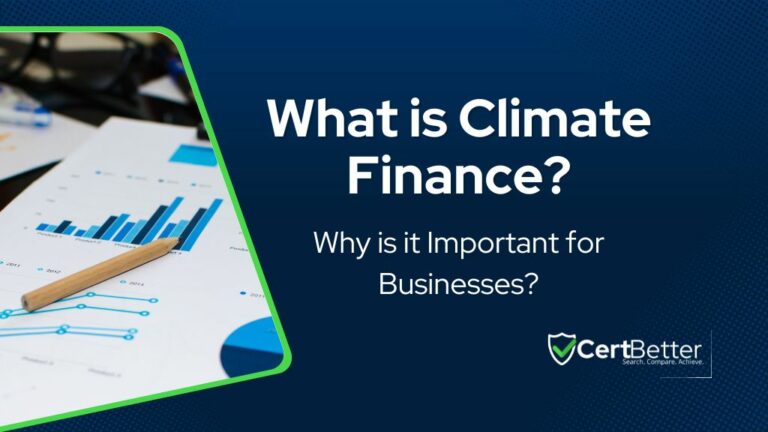What is Climate Finance? Why is it Important for Businesses?

Climate change is an undeniable reality that poses significant risks and opportunities for businesses worldwide. Rising global temperatures, melting ice caps, and increasing frequency of extreme weather events are clear indicators of a changing climate. For businesses, these changes bring challenges but also create avenues for innovation and growth. One critical component in this context is climate finance – a key enabler for mitigating climate risks and fostering sustainable business practices.
Understanding Climate Finance
Climate finance refers to local, national, or transnational financing – drawn from public, private, and alternative sources – that supports mitigation and adaptation actions addressing climate change.
According to the United Nations Framework Convention on Climate Change (UNFCCC), climate finance aims to reduce net greenhouse gas emissions and enhance resilience to the impacts of current and projected climate change.
This financing is essential in promoting renewable energy projects, improving energy efficiency, developing sustainable agriculture, and building climate-resilient infrastructure.
Climate finance flows from developed to developing countries to help them cope with the adverse effects of climate change and transition to low-carbon economies.
The Importance of Climate Finance for Businesses
Risk Mitigation and Resilience Building
Businesses are increasingly vulnerable to climate-related risks such as extreme weather events, supply chain disruptions, and resource scarcity. Climate finance helps companies invest in resilience-building measures, such as fortifying infrastructure against floods, droughts, and storms.
For example, agribusinesses can utilize climate finance to adopt climate-smart agricultural practices that reduce vulnerability to changing weather patterns.
Unlocking New Business Opportunities
Climate finance opens up new markets and business opportunities. Investments in renewable energy, energy efficiency, and sustainable technologies are not only good for the planet but also create jobs and drive economic growth.
Companies can benefit from government incentives and subsidies aimed at promoting green investments. For instance, Tesla’s rise as a leader in electric vehicles is partly fueled by access to climate finance and government support.
Enhancing Corporate Reputation and Stakeholder Trust
Consumers, investors, and other stakeholders are increasingly prioritizing sustainability. Businesses that actively engage in climate finance and adopt sustainable practices can enhance their reputation and build trust with stakeholders.
Companies like Unilever and Patagonia have built strong brands around their commitment to environmental sustainability, attracting loyal customers and responsible investors.
Compliance with Regulatory Requirements
Governments worldwide are implementing stricter environmental regulations and carbon pricing mechanisms to curb greenhouse gas emissions. Climate finance helps businesses comply with these regulations by funding projects that reduce their carbon footprint.
For example, the European Union’s Emissions Trading System (ETS) requires companies to purchase allowances for their carbon emissions, encouraging investments in low-carbon technologies.
Recommended: Understanding ISO 59004 Circular Economy Standard
Key Sources and Instruments of Climate Finance
Climate finance is sourced from various channels, including public funds from governments, private investments from businesses and financial institutions, and alternative sources like carbon markets. The instruments used to channel climate finance include grants, loans, equity investments, guarantees, and green bonds.
Public Finance
Public finance is essential for funding large-scale climate projects and mobilizing private investments. Governments provide grants and concessional loans to support climate mitigation and adaptation initiatives. The Green Climate Fund (GCF) is a prominent example, established to assist developing countries in climate action.
Private Finance
Private finance plays a crucial role in scaling up climate investments. Financial institutions and corporations invest in sustainable projects, often leveraging public funds to mitigate risks. The Task Force on Climate-related Financial Disclosures (TCFD) encourages companies to disclose their climate-related financial risks, promoting transparency and informed investment decisions.
Green Bonds
Green bonds are debt securities issued to raise capital for projects with environmental benefits. These bonds have gained popularity among investors seeking sustainable investment opportunities. For instance, Apple has issued multiple green bonds to finance renewable energy projects and improve the energy efficiency of its facilities.
Carbon Markets
Carbon markets, such as the EU ETS, allow businesses to trade carbon credits, providing a financial incentive to reduce emissions. Companies that lower their emissions can sell excess credits to other firms, creating a market-driven approach to climate mitigation.
Challenges and the Way Forward
Despite the growing importance of climate finance, significant challenges remain. The annual financial needs for climate mitigation and adaptation measures are set to increase to USD 9 trillion by 2030 and USD 10 trillion by 2050 (source), far exceeding current funding levels. Mobilizing sufficient climate finance requires concerted efforts from governments, businesses, and international organizations.
See also: Climate Change in ISO 9001 — How to Implement Into QMS?
To overcome these challenges, businesses must integrate climate considerations into their strategic planning and investment decisions. Collaborative efforts, such as public-private partnerships, can amplify the impact of climate finance.
Additionally, innovative financial instruments and mechanisms, such as blended finance and climate insurance, can help bridge the funding gap.
Get Help from Climate Finance Consultants
ISO standards provide a robust framework for managing environmental responsibilities and ensuring that climate finance efforts are systematic, efficient, and aligned with global best practices. ISO recommends the following standards:
Implementing an effective climate finance framework can be complex, requiring specialized knowledge and expertise. Find an ISO consultant nearby to help you with Climate Finance framework!
ISO 14097 Greenhouse gas management and related activities
ISO 14100 Guidance on environmental criteria to support green finance
ISO 14001 Environmental management systems
ISO 32210 Sustainable finance
Conclusion
Climate finance is a critical tool for businesses to navigate the risks and opportunities posed by climate change. By investing in mitigation and adaptation projects, companies can enhance their resilience, unlock new business opportunities, comply with regulations, and build a sustainable future. As the world grapples with the escalating impacts of climate change, the role of climate finance in driving sustainable business practices will only grow in importance. Now is the time for businesses to act decisively, leveraging climate finance to secure their future in a rapidly changing world.
- Last updated: June 19, 2024
- CertBetter
Our community of compliance professionals and ISO experts is ready to provide you with insightful answers and practical solutions. Join the discussion now!
- Recommended Reads
- 31 reads
-
Frequently Asked Questions
Understanding ISO Terminology: Guide to Important Terms and Concepts
No posts found
ResetConnect with ISO Certification Consultants
CertBetter makes it easy to find ISO certification consultants and compliance professionals from around the globe.

